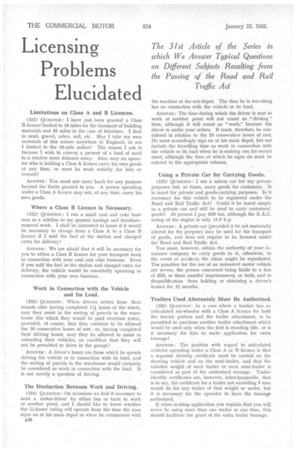Licensing Problems Elucidated
Page 54

If you've noticed an error in this article please click here to report it so we can fix it.
The 3 Is! Article of the Series in which We Answer Typical Questions on Different Subjects Resulting from the Passing cif the Road and Rail
Traffic Act
Limitations on Class A and B Licences.
(131) QUESTION: I have just been granted a Class B licence limited to 10 miles for the transport of building materials and 35 miles in the case of furniture. I deal in sand, gravel, ashes, soil, etc. May I take my own materials of this nature anywhere in England, or am I limited to the 10-mile radius? The reason I ask is because I wish to convey a present of a load of sand to a relative some distance away. Also, may an operator who is holding a Class A licence carry his own goods at any time, or must he work entirely for hire or reward?
AuswER : You must not carry loads for any purpose beyond the limits granted to you. A person operating under a Class A licence may not, at any time, carry his own goods.
Where a Class B Licence is Necessary.
(132) QUESTION: I run a small coal and coke busi, ness as a sideline to my general haulage and furnitureremoval work. I shall be interested to know if it would be necessary to change from a Class A to a Class B licence if I sold the fuel at the station and charged extra for delivery?
ANSWER: We are afraid that it will be necessary for you to utilize a Class B licence for your transport work in connection with your coal and coke business. Even if you sold the fuel at the station and charged extra for delivery, the vehicle would be essentially operating in connection with your own business.
Work in Connection With the Vehicle and Its Load.
(133) QUESTION: When drivers return from their rounds after having completed 14 hours at the wheel, may they assist in the sorting of parcels in the warehouse (for which they would be paid overtime rates), provided, of course, that they continue to be allowed the 10 consecutive hours of rest ; or, having completed their driving hours, may they be allowed to assist in unloading their vehicles, on condition that they will not be permitted to drive in the garage?
ANSWER: A driver's hours are those which he spends driving the vehicle or in connection with its load, and the sorting of parcels in the warehouse would certainly be considered as work in connection with the load. It is not merely a question of driving.
The Distinction Between Work and Driving.
(134) QUESTION: On occasions we find it necessary to send a molar-driver by either bus or train to work at another point, and I should like to know whether the 53--hours' ruling will operate from the time the man signs on at his main depot or when he commences with
the machine at the sub-depot. The time he is travelling has no connection with the vehicle or its load,
ANSWER: The time during which the driver is sent to work at another point will not count as " driving " time, although it will count as "work," because the driver is under your orders. It must, therefore, be considered in relation to the 10 consecutive hours of rest. He must accordingly sign on at his main depot, but not include the travelling time as work in connection with the vehicle or its load when he is making out his record sheet, although the time at which he signs on must be entered in the appropriate column.
Using a Private Car for Carrying Goods.
(135) QUESTION: I use a saloon car for my private purposes but, at times, carry goods for customers. It is taxed for private and goods-carrying purposes. Is it necessary for this vehicle to. be registered under. the Road and Rail Traffic Act? Could it be taxed simply as a private car and still he used to carry customers' goods? At present I pay £20 tax, although the R.A.C. rating of the engine is only 15.9 lip.
ANSWER: A private car (provided it be not materially altered for the purpose) may be used for the transport of goods, and does not require to be licensed under the' Road and Rail. Traffic Act, You must, however, obtain the authority of your insurance company to carry goods in it, otherwise, in the event of accident, the claim might be repudiated. Thii penalties for the use of an uninsured motor vehicle are severe, the person concerned being liable to a fine of 250, or three months' imprisonment, or both, and to disqualification from holding or obtaining a driver's licence for 12 months.
Trailers Used Alternately Must Be Authorized.
(13(i) QUESTION: In a case where a haulier has an articulated six-wheeler with a Class A licence for both the tractor portion and the trailer attachment, is he permitted to purchase another trailer attachment which would be used only when the first is standing idle, or is it necessary for him to make application for extra tonnage?
ANSWER: The position with regard to articulated vehicles operating under a Class A or B licence is that a separate identity certificate must be carried on the drawing vehicle and on the semi-trailer, and that the unladen weight of each trailer or each semi-trailer is considered as part of the authorized tonnage. Trailer identity certificates are, however, interchangeable, that is to say, the certificate for a trailer not exceeding 5 tons would do for any trailer of that weight or under, but it is necessary for the operator to have the tonnage authorized.
If when making application you explain that you will never be using more than one trailer at any time, this should facilitate the grant of the extra trailer tonnage.




































































































